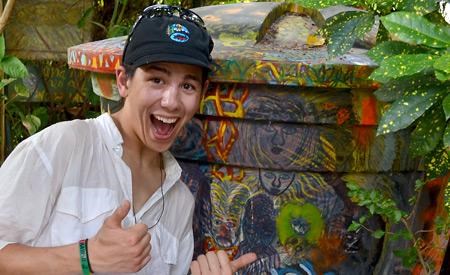Back from Cuba with stories to share, Coast Mountain Academy (CMA) students will be discussing what they experienced during their service learning trip.
“They’re very grateful to their community which supported their experience and they wish to share their stories,” said CMA instructor Ryan Barfoot.
CMA focuses on leadership, citizenship and adventure. On top of that, the trip also gave students the opportunity to learn about natural sciences, social studies, history, economics, and of course the Spanish language. Described as a service learning trip, “this experience enabled students to learn with both their heart and hands,” said Barfoot. “We worked with Cuban youth on an old dump site converting over to a community garden. Together we transformed it from a landscape of neglect to a landscape of nutrition and learning.”
Studying permaculture was an underlying but central idea to their trip. Permaculture practices are informed by three basic principles: earth care, people care and fair share. “In terms of food production, it includes skills such as stacking functions, using space efficiently, developing closed loop systems for which ‘waste’ is repurposed to serve important functions, and sharing the wealth as widely as possible,” said Anika Watson, one of the 13 students who went on the trip.
Cuba is uniquely positioned at this point in history to serve as an important teacher when it comes to both the agricultural and social side of the permaculture equation, said Barfoot.
With extreme restrictions on its ability to rely on the importing and exporting of goods for the wellbeing of its people, the country has found innovative ways to look inward for resources through which it can sustain itself. Janet Newbury, a co-facilitator and mentor for the CMA trip, sees parallels between current economic challenges Powell River faces and Cuba’s experience.
“Cuba has been developing policies and practices on the basis of re-distributing its existing resources, rather than acquiring more,” said Newbury. “They have a lower child mortality rate than Canada, and are actually increasing their wilderness areas through concerted reforestation efforts.”
After several days of touring large and small scale projects, the students rolled up their sleeves and got to work at Bella Mar, a non-profit project in Matanzas, for the second half of their trip.
Perhaps most significant for many of the students were the interpersonal relationships that were developed during that time. While working at Bella Mar, CMA students were partnered with their Cuban peers, for whom agricultural work is an inherent part of the public education system.
“CMA kids all had Cuban buddies that we worked with on the project,” said CMA student Konane Lauretta. “It was really fun and challenging to work together with kids who didn’t speak the same language. I think the fact that we shared a common goal helped us find other commonalities.”
The CMA students are excited to keep these important conversations going now that they’re back home in Powell River. They invite the community to hear more about and discuss their experiences in Cuba at a public event that will be held at 7 pm on Monday, May 13, at Cranberry Seniors’ Centre. For more information readers can contact Willow Dunlop at [email protected].



